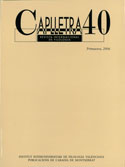Contraintes et libertés textuelles
DOI:
https://doi.org/10.7203/caplletra.40.4837Paraules clau:
genre Types (genres des texts), Type of speeches, textual Restrictions, textual Freedoms, Narrative, Praxeology, Expression of Temporality, literary Work Resum
Resum
The article starts from a conception of language according to which the semiotic units that speakers use do not emanate from individual mental processes but from the socialization of representation instruments which, being individual elements initially, have later been involved in processes of communicative circulation. In the same way that, in each language, verbal uses are limited by a series of restrictions in the constitution of some phonic, lexical or morphosyntactic structures, there are also some other constraints that affect textual genres. This means that these are the product of the history of the uses of language and that they work at a praxeologic level. These ideas apply to the study of expression of temporality in the story (récit) and in the narration (narration), with exemplification taken from real texts, mostly of literary character. Both in ordinary verbal work and in literary work, the freedom of the style works on
some pre-existent textual models which have to be known and mastered in order to adapt them to the specific conditions of each ordinary verbal action or literary production.
 Descàrregues
Descàrregues
Descàrregues
Publicades
Com citar
-
Resum282
-
PDF111
Número
Secció
Llicència
L’autor o autora que adrece un treball a la redacció de Caplletra perquè siga publicat ha de ser la persona titular legítima dels drets d'explotació. La legitimació per a la publicació del treball ha d’incloure també les imatges, les taules, els gràfics i altres materials que puguen complementar el text, amb independència de si n'és l'autor o autora.
Copyright. Quan publica el treball en la revista, l'autor o autora cedeix a Caplletra. Revista Internacional de Filologia els drets d'explotació (reproducció, distribució i comunicació pública), tant per a l'edició impresa en paper com per a la versió electrònica, que serà accessible mitjançant la xarxa Internet.
Tots els treballs publicats en Caplletra es troben sota una llicència Creative Commons del tipus Reconeixement-NoComercial-SenseObraDerivada 4.0.
RESPONSABILITAT
Caplletra. Revista Internacional de Filologia no s'identifica necessàriament amb els punts de vista mantinguts en els treballs que publica.
Caplletra. Revista Internacional de Filologia declina tota responsabilitat derivada de qualsevol vulneració eventual dels drets de propietat intel·lectual que poguera ser duta a terme pels autors o autores.






